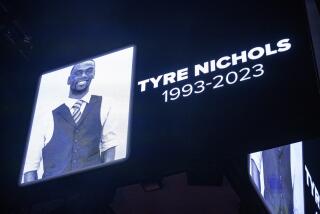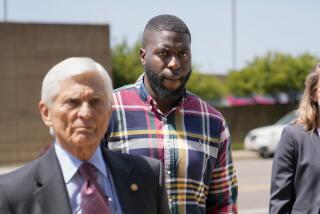Evidence Wrangle in Oklahoma Blast Case Wraps Up
DENVER â Attorneys in the Oklahoma City bombing case wrapped up a four-day court hearing Saturday, leaving to a federal judge the decision on whether to allow crucial evidence against suspects Terry L. Nichols and Timothy J. McVeigh when they eventually stand trial.
At issue is whether government officials violated the law in their treatment of Nichols once he voluntarily surrendered, whether they manipulated his wife into allowing their home to be searched and whether they purposely concealed their plans to arrest Nichols.
âNobody doubts this is a very important case,â said Nicholsâ attorney, Michael E. Tigar, arguing that the disputed evidence should be thrown out because his clientâs rights were violated. âWe had an explosion in Oklahoma City that brought great harm. But the Constitution that has served us so well and for so long should not be another victim.â
As for McVeigh, his lawyers are asking U.S. District Judge Richard P. Matsch to bar the government from presenting evidence that McVeighâs clothing contained residue from explosive materials. They argued that police officers in Perry, Okla., where McVeigh was arrested, gave the clothes to the FBI before he was advised that he was being charged in the bombing.
But government lawyers maintained that federal agents broke no laws in putting together their evidence in the days following the worst terrorist attack on U.S. soil.
A truck carrying ammonium nitrate fertilizer and diesel fuel blew up the Alfred P. Murrah Federal Building on April 19, 1995, killing 168 people and injuring 600 others. The trial was moved to Denver because of extensive media coverage of the blast and the widespread impact of the tragedy within Oklahoma City.
The arguments by McVeighâs lawyers were limited to the matter of how his clothing was obtained by the FBI. But the vast majority of the hearing centered on contentions by Nicholsâ attorneys that he and his wife were used by the FBI to gather incriminating evidence without being promptly notified that Nichols was going to be arrested.
After his surrender at the Herington, Kan., police station two days after the bombing, FBI agents interviewed Nichols for nine hours and did not end the interrogation until after midnight. At that point, Nichols stopped talking and the agents took him into federal custody, though they had obtained an arrest warrant hours earlier.
In the interviews, Nichols told the FBI a long story about his relationship with McVeigh and hinted that his former Army buddy might have had a role in the bombing.
But the next day, when he first appeared before a judge in Wichita, Kan., his state of mind appeared clouded, a witness said Saturday. Daryl Ingermanson, a deputy federal marshal, testified that he heard Nichols say in the courthouse: âItâs all a jumble in my brain right now.â
Also testifying Saturday was FBI agent Daniel Jablonski, who said Nichols told officials about selling fertilizer and buying a fuel meter.
âHe volunteered that he had at one point in time delivered fertilizer to farmers,â Jablonski said. âHe also volunteered some information about a fuel meter. Just out of the blue he brought up that he had purchased a fuel meter two weeks prior. He was very proud of the fact that he had purchased this for well under the asking price.â
Although Nicholsâ lawyers insist that the fuel meter was broken and inoperable, the government has suggested the apparatus was used to measure the amount of diesel fuel needed for the fertilizer bomb.
But another FBI agent, Mary Jasnowski, testified that after searching Nicholsâ home and inventorying potential pieces of evidence, agents forgot to take the fuel meter and had to get it on a second trip. âIt was inadvertently left,â she said. âWe had every intention of taking it.â
Also seized was $5,000 in cash and 12 gold and silver coins found under a mattress in the bedroom. The money was tested at the FBIâs laboratory for fingerprints, including those of McVeigh, before all but $200 was returned to Nicholsâ wife.
Scott Mendeloff, an assistant U.S. attorney, declined to say whether the remaining $200 would be used as evidence in the case.
In another development Saturday, Matsch made public a small portion of the FBI notes taken during Nicholsâ interviews after his surrender. However, he kept under seal all of Nicholsâ statements about whether he or McVeigh had a role in the bombing.
The Times last year obtained copies of the FBI reports from the Nichols interviews. According to those reports, Nichols first said âI cannot believeâ that McVeigh was involved in the bombing. But he later cried and said âit looks like maybe he did itâ and âI think I may have, I may have accidentally helped him in doing it.â
More to Read
Sign up for Essential California
The most important California stories and recommendations in your inbox every morning.
You may occasionally receive promotional content from the Los Angeles Times.











